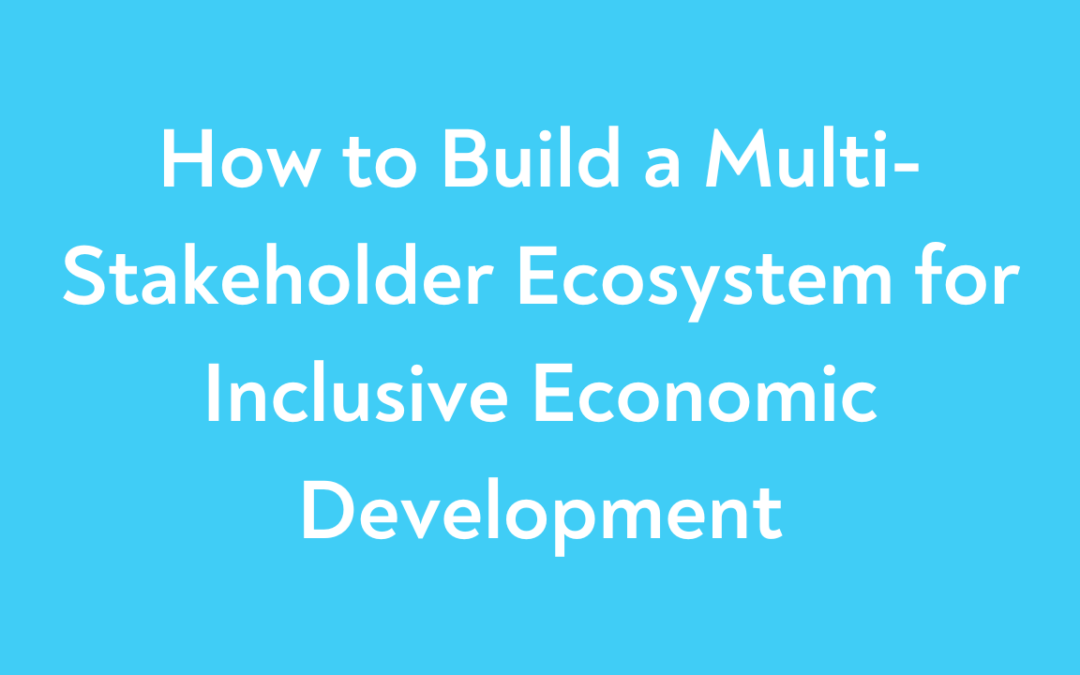Achieving inclusive economic development requires the collective effort of various stakeholders, including businesses, advocacy organizations, government bodies, and local communities. In this article, we’ll delve into the specifics of how supplier diversity advocacy organizations can build and maintain multi-stakeholder ecosystems to drive inclusive economic development.
Building Multi-Stakeholder Ecosystems: Where to Start?
A multi-stakeholder ecosystem is, by definition, a network of diverse contributors working collaboratively towards shared goals. For supplier diversity advocacy organizations, the key lies in bringing together businesses, diverse suppliers, policy-makers, financial institutions, and community organizations to work in unison towards inclusive economic development.
Fostering Partnerships with Businesses
The starting point of building a multi-stakeholder ecosystem is developing strong partnerships with businesses – both large corporations and diverse suppliers. Advocacy organizations should promote discussion and collaboration between buyers and suppliers, highlighting the potential mutual benefits of working together and sparking genuine relationships.
Engaging Policymakers
Engaging in dialogue with policy-makers is crucial to ensuring supportive policies and regulations for supplier diversity are made. Advocacy organizations can lobby for public procurement policies that back diverse suppliers and promote incentives that encourage businesses to diversify their supply chains.
Collaborating with Financial Institutions
Advocacy organizations can work with financial institutions to facilitate greater access to capital for diverse suppliers. This could include promoting special loan schemes, grants, or venture funds targeted at these businesses.
Working with Community Organizations
Community organizations, NGOs, and educational institutions are critical stakeholders in local ecosystems. They can provide training, mentorship, and other forms of support to diverse suppliers, helping them become more competitive and ready for business engagements.
Measuring Impact and Celebrating Success
A multi-stakeholder ecosystem should not only be action-oriented but also impact-driven. Regular assessments of the collective impact of the ecosystem’s efforts are vital. These insights can guide future actions and strategies. Celebrating successes, no matter how small, is equally important to maintain momentum and inspire continued commitment from all stakeholders.
Promoting Continuous Learning and Improvement
Encouraging a culture of continuous learning and improvement can help the ecosystem adapt to changing circumstances and overcome new challenges. This can be achieved through regular feedback loops, shared learning sessions, and the integration of lessons learned into future strategies.
Leveraging Each Stakeholder’s Unique Strengths
Each stakeholder in the ecosystem brings unique strengths, resources, and perspectives. Recognizing and leveraging these strengths can enhance the collective impact of the ecosystem. Advocacy organizations can play a key role in coordinating these efforts, ensuring that each stakeholder’s contributions are effectively channeled towards the shared goal of furthering inclusive economic development.
How Multi-Stakeholder Ecosystems Support Inclusive Economic Development
Creating a multi-stakeholder ecosystem is not an end in itself, but a means towards achieving inclusive economic development. Here’s how such ecosystems contribute to this goal:
- Promoting Economic Opportunity
By facilitating solid supplier diversity practices, these ecosystems create economic opportunities for underrepresented businesses in our communities. When MBEs are given an opportunity to thrive, there is no ceiling for how much they can go on to achieve.
- Supporting Community Development
Supplier diversity results in job creation and investment in local communities, supporting broader community development. This ripple effect is amplified when large corporations intentionally source from diverse local suppliers.
- Encouraging Sustainable Practices
Many diverse suppliers are small businesses that place a high value on sustainability. Promoting these businesses can help to drive sustainable practices across supply chains, creating new ways to save funds and increase revenue generation.
Building a multi-stakeholder ecosystem for inclusive economic development is a complex but rewarding process. It requires active engagement, collaboration, and commitment from all stakeholders. As an advocacy organization, your role is critical in bringing these stakeholders together, fostering a shared understanding of the benefits of supplier diversity, and guiding collective action towards this shared goal. At Hire Ground, we’re here to support you in this mission. Together, we can drive meaningful change.
Key Takeaways:
- Building a multi-stakeholder ecosystem involves creating networks of diverse contributors such as businesses, diverse suppliers, policymakers, financial institutions, and community organizations. These ecosystems work collaboratively towards shared goals, such as inclusive economic development.
- Key strategies for fostering such ecosystems include:
- Fostering partnerships with businesses to highlight the benefits of supplier diversity.
- Engaging policymakers to promote supportive regulations and incentives for supplier diversity.
- Collaborating with financial institutions to facilitate greater access to finance for diverse suppliers.
- Working with community organizations to provide training, mentorship, and other forms of support to diverse suppliers.
- Multi-stakeholder ecosystems drive inclusive economic development by:
- Creating economic opportunities for underrepresented businesses.
- Supporting community development through job creation and local investment.
- Encouraging sustainable practices across supply chains.
- Essential elements for sustaining these ecosystems include strong communication and transparency, regular impact assessments, and a culture of continuous learning and improvement.
- Supplier diversity advocacy organizations play a critical role in bringing these stakeholders together, guiding collective action towards inclusive economic development, and leveraging each stakeholder’s unique strengths effectively.


Recent Comments